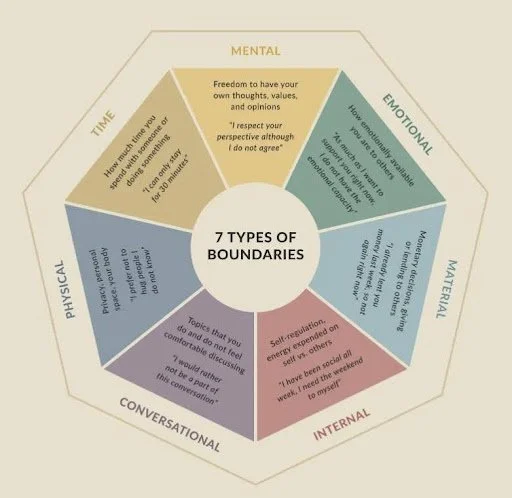Building Your Personal Fortification: A Guide to Healthy Boundaries
Building Your Personal Fortification: A Guide to Healthy Boundaries
by Alissa Bell
Have you ever felt overwhelmed, drained or just plain off after interacting with certain people or situations? The culprit of this feeling may be undefined or poorly maintained boundaries. Think of boundaries as the invisible lines that delineate your individual space, energy, and emotional well-being from others… They define where you end and others begin and are fundamental tools for self-preservation and fostering respectful relationships.
So what exactly are boundaries, why are they so crucial, and how can we strengthen this muscle?
The Many Dimensions of Boundaries
Here's a breakdown of key areas where boundaries play a role:
Physical Boundaries: These relate to your personal space and the level of physical touch you are comfortable with. This encompasses everything from personal proximity to consent for physical contact.
Emotional Boundaries: These pertain to your feelings and emotional capacity. They help you manage emotional sharing, avoid absorbing others' feelings, and ensure you're not overextending yourself emotionally.
Intellectual Boundaries: These involve your thoughts, ideas, and opinions. They enable you to express your viewpoints and respect those of others, even when they differ from your own.
Sexual Boundaries: These define your comfort levels and consent regarding sexual interactions. They are about honoring your desires, preferences, and limits in intimate relationships.
Material Boundaries: These concern your personal possessions and financial resources. They involve making decisions about lending, borrowing, and giving in ways that align with your comfort and well-being.
Time Boundaries: These govern how you allocate your time and energy. They allow you to prioritize your commitments and protect your personal time from excessive demands.
Conversational Boundaries: These relate to the topics you are willing to discuss and those you prefer to avoid. An example might be choosing to step away from a discussion that makes you uncomfortable.
Internal Boundaries: These involve self-regulation and managing the balance between focusing on your own needs and attending to others. For instance, recognizing when you need personal time after a period of social engagement.
What the Research Tells Us
Recent psychological research confirms that personal boundaries serve as fundamental tools for self-preservation and mental health maintenance (Mathe & Kelly, 2023).
The concept of healthy boundaries isn't just about self-help; it has roots in psychological research, impacting both our neurological well-being and our relational patterns.
Mental Health Connection: A 2023 study published in SAGE Open found that individuals with well-defined boundaries demonstrated greater psychological resilience, higher self-esteem, and stronger social networks (Mathe & Kelly, 2023).
Compassion and Boundaries: Brene Brown’s (2021) research on vulnerability shows that boundaries make genuine empathy possible; without them, people risk overextension and resentment.
Professional Practice: A 2024 manifesto on relationship-based practice emphasized that boundaries are central to safe, ethical, and effective work in professional settings (Darley et al., 2024).
The Spectrum of Boundary Making
Boundaries exist along a continuum, from overly permeable (porous) to adaptive and balanced (healthy) to excessively rigid. Understanding the range of these boundary types can help us identify areas where personal growth in setting limits might be beneficial.
Rigid Boundaries: These are overly strict and can lead to isolation or difficulty forming close connections. You might be reluctant to share, receive, or compromise, creating distance in relationships.
Healthy Boundaries: These are flexible and clear. They allow for connection and intimacy while protecting your well-being. They signify self-respect and foster mutual respect in relationships.
Porous Boundaries: These are often too permeable, leading to overextension, people-pleasing, and difficulty saying no. You might find yourself easily influenced by others' emotions or needs.
(adapted from Ellyn, 2022)
Strategies for Building Boundaries
Self-Awareness: Understanding your own needs, values, and limits
Clear Communication: Expressing boundaries directly and kindly
Consistency: Maintaining boundaries across different relationships and situations
Flexibility: Adjusting boundaries as relationships and circumstances evolve
Understanding these connections can provide valuable insight into your own boundary patterns and empower you to cultivate healthier interpersonal dynamics. By recognizing how your past experiences may influence your present boundary habits, you can begin to intentionally build and reinforce the personal fortifications necessary for your well-being.
Ready to draw some boundaries?
Work with a therapist and define boundaries in your relationships.
References:
Brown, B. (2021). Atlas of the heart: Mapping meaningful connection and the language of human experience. Random House.
Darley, D., Blundell, P., Cherry, L., Wong, J. O., Wilson, A. M., Vaughan, S., Vandenberghe, K., Taylor, B., Scott, K., Ridgeway, T., Parker, S., Olson, S., Oakley, L., Newman, A., Murray, E., Hughes, D. G., Hasan, N., Harrison, J., Hall, M., & L. Guido-Bayliss. (2024). Breaking the boundaries collective – A manifesto for relationship-based practice. Ethics and Social Welfare, 18(1), 1–13. https://doi.org/10.1080/17496535.2024.2317618
Ellyn. (2022, September 5). Coach Ellyn. Coach Ellyn. https://www.coachellyn.com/blog/bad-boundaries
Mathe, J. R., & Kelly, W. E. (2023). Mental boundaries relationship with self-esteem and social support: New findings for mental boundaries research. Imagination, Cognition and Personality, 43(1), 027623662311582. https://doi.org/10.1177/02762366231158274
Nash, J. (2018, January 5). How to set healthy boundaries & build positive relationships. Positive Psychology. https://positivepsychology.com/great-self-care-setting-healthy-boundaries/




